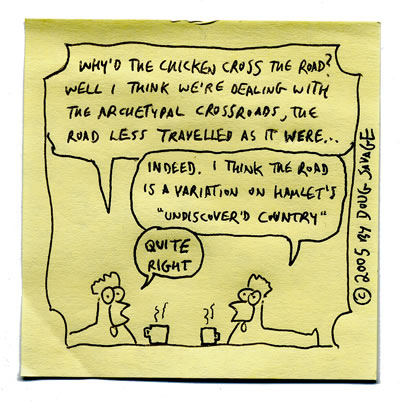
At the risk of being provocative, let me ask if am I the only one to think that Frye’s use of the word archetype is his single biggest error in judgement as a literary theorist, possibly one of the biggest errors of judgement in literary studies of all time, on par with the loss of Aristotle’s treatise on comedy?
Not only does no one know what the word means, not only is Frye’s meaning overwhelmed by and confused with other closely related meanings, but the sheer Greekness and thus foreignness of the word lends it to easy dismissal.
The word convention would have been so much more acceptable, so much harder to attack, so much harder to misconstrue, and in particular would make it clear from the beginning that literature is a human and social construct.
This last point, which Frye himself insists on may seem at first blush like a capitulation to the determinists, but in fact it undermines their accusation against Frye of essentialism (whatever that means) while exposing their own attempts to impose determinism on literature as an attempt to impose determinism on human beings.
Am I wrong?

You may be right Clayton, especially since the term was already current and associated with Jungians, so it was impossible to separate Frye’s meaning from their meaning of the word. And of course in Jung the archetype is eesentialist in a way that it isn’t in Frye. However, I am not sure that the term is completely meaningless. Frye certainly defines it. The question, as you suggest, is: does it differ from the term literary convention? It seems to be a type of literary convention. It would be good to look at the different definitions he comes up with. But there is no doubt that the use of the term had a good deal to do with the pigeonholing and dismissal of Frye’s work: it was an easy way of reducing his work to a simplicity that could then be discredited almost out of hand.
The word convention is more general than the word archetype, so I know I can’t argue for their equivalence. But if Frye’s work is to be identified with a single word, I would rather it be convention than archetype. If someone comes along who believes Frye’s purpose and work is basically sound but wants to “reboot” it, they would do well to identify their approach with the word convention rather than the word archetype, and generally avoid all Greek terms in favour of latinate terms.
Without looking it up, I seem to remember Frye defining the word archetype as a cluster of conventional images. “Conventional image cluster” would be a more explicit and less loaded term.
Frye was interested in the structures of literature, structures of all different levels and types, and it seems to me that the word convention is the best word to reflect the scope of Frye’s work.
Great Post!! Frye was not only a great critic but his own best critic and referred to himself as a terminological buccaneer, raiding other subjects and reconstructing/reclaiming their terms. But believe it or not, he claims he decided to use the word archetype after seeing its use by an English writer, (I will get the reference) before Jung monopolized it.
Personally, I love the sound and look of the word, *archetype* and love using it in parallel form whenever I teach how to use archetypes to fight *stereotypes*. *Arch* sounds so beautiful in a je ne sais quois, Kantian “purposiveness without purpose” way, and it goes so well with the other words associated with Frye, his arch*itectonic criticism, the arch*itect of the spiritual world, fighting the arch*enemy, advertisement, Politics, and all the critical Schools of Resentment in Bloom’s phrase.
If Frye is to be known for one word, I don’t think it would be archetype. As a critic called him, “Mr. Myth”, in a review of Words with Power, I would go with that.
I believe in On Education, Frye is fond of the word convention and loves the idea that it means not only a repeating pattern in literature but also a social meeting for people who care about words. So Clayton, I think Frye would agree with you…although, for me, the word convention sounds too conventional. Again, I like “myth” being associated with Frye, but if I had to pick any one word for Frye, the word which one could use to rebuild all of Frye’s thoughts, it would have to be another Greek word, *Kerygma*…I love it and I would be very impressed if someone hacked into my online accounts, and figured out that was my password.
Frye explaining “archetype” from “Criticism, Visible and Invisible”, The Stubborn Structure:
“It is true that I call the elements of imagery archetypes, because I want a word which suggest something that changes its context but not its essence. James Beattie, in ‘The Ministrel’ [poem]…adds a footnote to the last phrase: “General ideas of excellence, the immediate archetypes of sublime imitation, both in painting and in poetry.”…I think of the term [archetype] as indigenous to criticism, not as transferred from Neoplatonic philosophy or Jungian psychology. However, I would not fight for a word, and I hold to no “method” of criticism beyond assuming that the structure and imagery of literature are central considerations of criticism.